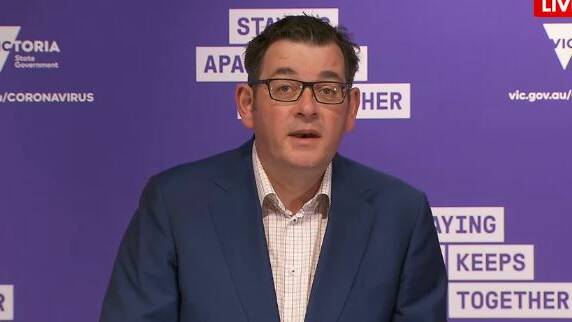
A meat industry analyst and the union representing the sector have played down claims Premier Daniel Andrews is targeting the sector, over coronavirus outbreaks.
Subscribe now for unlimited access to all our agricultural news
across the nation
or signup to continue reading
At one of this week's daily briefings, Mr Andrews urged workers not to go to work, if they were sick.
But he said it was unfair to single out abattoirs, and meat processing plants.
"If we were to continue to see outbreaks, people attending work quite obviously when they shouldn't be, then every option comes on the table,' Mr Andrews said.
"That's not the position at the moment."
He said abattoirs and cool stors were not the only high risk-sites.
"We shouldn't single them out to the exclusion of others," Mr Andrews said.
"It's not just cool stores, meatworks, abattoirs, whatever you want to call them, there are lots of different sites.
"It's not just big warehouses, distribution, freight, logistics centres - there's lots of different sites: aged care, healthcare, the list goes on."
But he said the next steps may include closing industries, if people continued to attend work, when they were sick.
Mr Andrews said WorkSafe staff had done 200 inspections in the last week, passing on the message that employers also had a role to play.
"Business owners have a really big stake in this also, we really have to work to keep anyone who has symptoms away from work."
When there was an infection outbreak, the business would be subject to deep cleaning, involving public health team workers.
"It's got to be enterprise by enterprise, workplace by workplace, and I am confident they are stepping up to do that work, because they need to."
Read more:
Government failure
The comments led the state opposition to claim the government's failure to get coronavirus outbreaks at meatworks under control was threatening the supply of food to supermarket shelves.
Opposition Agriculture spokesman Peter Walsh said high demand for meat through the COVID-19 crisis had seen supermarket shelves stripped bare, but the government had flagged it would consider closing meat processors as part of its pandemic response.
Mr Walsh said the Premier must guarantee the government would work with all sectors in the food supply chain to safely stay open.
"Our farmers are producing enough food to keep our supermarket shelves fully stocked and processors are implementing plans to keep workers safe," Mr Walsh said.
If the government closed down parts of the supply chain there would be food shortages.
"The virus has spread like wildfire through meat processors since the first outbreaks at Cedar Meats in early May.
"But instead of working with businesses to safeguard our food supply, Daniel Andrews will shut them down.
"Abattoirs are a critical link in our food supply chain, but there's a shocking lack of support from the government to make sure they can safely keep their doors open."
Mr Walsh said reports of delays in contact tracing following the most recent outbreak at Australian Lamb Company, Colac showed the government hadn't learned from its mistakes in Melbourne.
"Cedar Meats was the first cluster that got out of control because the government didn't act quickly enough, but still we see this happening again and again," Mr Walsh said.
But Thomas Elder Markets livestock analyst Matt Dalgleish said he read the Premier's comments as an indication the government was considering stage four restrictions.
"He's rattled off a range of different hotspots, rather than targeting meatworks,' Mr Dalgleish said.
"It's more through frustration that people are not doing the right thing, particularly in Melbourne
"But I don't think he's necessarily targeting meatworks."'
Mr Dalgleish said the concerns appeared to be sparked by overseas experiences, where the meatworks environment seemed to allow the virus to persist for longer.
And Australasian Meat Industry Employees Union state secretary Paul Conway said no-one would envy the Premier, or Chief Health Officer, Brett Sutton, at the moment.
He said he was confident the sector would not be shut down.
"The comments were in a response to a question aksed of him, and from that people have drawn a lot of lines, from dot to dot, and looked at an industry shutdown, for two weeks," Mr Conway said.
"It;s a very fluid situation, and the government are looking at all the options."
He said he'd been talking with state and federal politicians, to determine a position on the security of meatworks, in the future.
JBS' approach
A spokesman for Victoria's biggest abattoir, JBS' Brooklyn, said the plant closed for two weeks, testing each worker twice.
"JBS Australia has worked hand in glove with DHHS to make the Brooklyn facility as COVID Safe as it's possible to be," the spokesman said.
"Right now, our focus is on safeguarding the jobs of the 1230 Victorians who rely on us for their livelihood, safeguarding the supply of meat to both our local and export markets, and most importantly, doing whatever it is in our power to do to safeguard the health and well-being of our workers and the wider community in which we operate.
"Just yesterday, the AMIEU, with whom we have an excellent working relationship, went on record saying that they were satisfied we had done everything possible to make our workplace COVID Safe."
Have you signed up to Stock & Land's daily newsletter? Register below to make sure you are up to date with everything that's important to Victorian agriculture.


